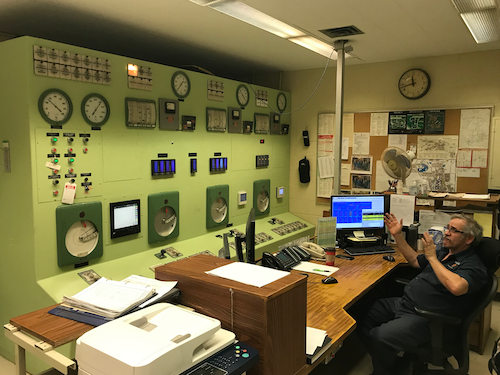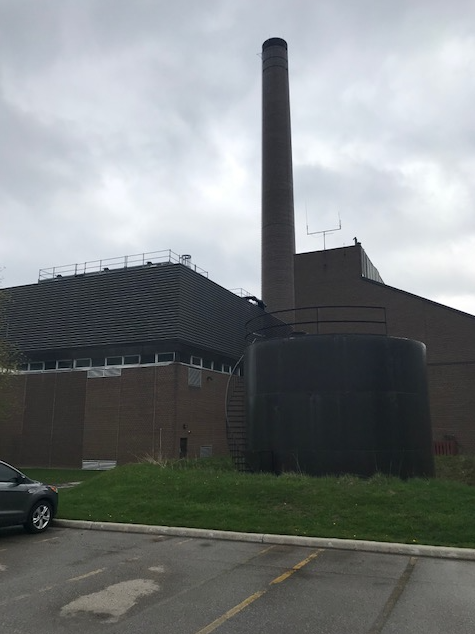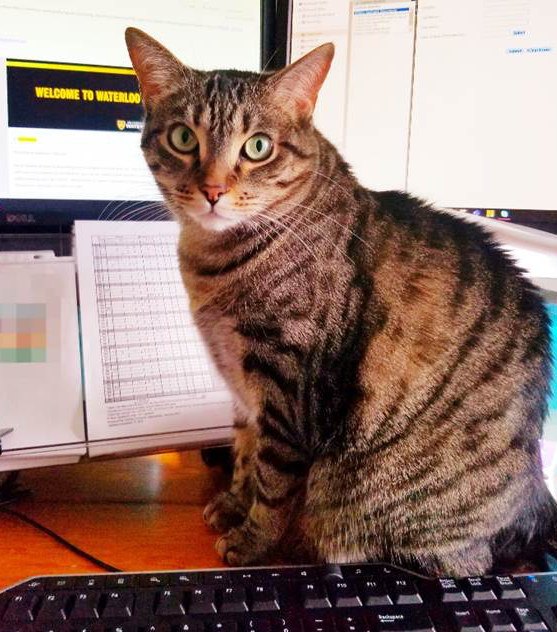Editor:
Brandon Sweet
University Communications
bulletin@uwaterloo.ca
The pivot to remote teaching: what some instructors have learned
A message from the Centre for Teaching Excellence (CTE).
The COVID-19 pandemic has impacted every sector of society, including education: remote teaching has become, at least for now, the new norm. At the University of Waterloo, instructors have met the challenge of remote teaching by developing alternative ways of presenting course content, by recasting learning activities, and by adjusting how students are assessed. Creativity and flexibility have informed all these modifications.
At the end of the winter term, Waterloo instructors faced the challenge of not being able to hold in-person final exams. Many of them – such as Marcel Pinheiro (Biology), Su-Yin Tan (Environment), Ian Milligan (History), and Anna Polotskaia (Psychology) – created take-home exams instead. For some, it was an opportunity to re-think the exam. Marcel, for example, developed a take-home exam that used long-answer questions to target the higher levels of Bloom’s Taxonomy of the Cognitive Domain.
Roland Hall (Biology) also developed a new take-home exam, but reweighted it: 15 per cent instead of 35 per cent, with the difference being redistributed over other assignments that had not yet been submitted, but which were based on material that had been covered prior to the COVID-19 measures. Stefan Steiner (Statistics and Actuarial Science) gave a take home final assessment through Watberry, a virtual manufacturing environment. His students had to interact with a unique version of the virtual process in an efficient manner to determine how to improve it and document their thought process and results.
Other instructors – such as Leia Minaker (Planning), Moira Glerum (Biology), and Ayman El-Hag (Electrical and Computer Engineering) – created fully online final exams using tools such as LEARN, Crowdmark, or Mobius. Both Leia and Moira also gave their students the choice of opting out of the online final exam and instead being assessed on their best term work only. Of Moira’s 163 students, the great majority chose to forgo the exam. Students were so appreciative of this option that Moira is now considering doing the same thing every year, whether her course is online or not.
Instructors also pivoted to alternative means for presenting course content. Joe West (Applied Mathematics) and Firas Mansour (Physics and Astronomy), for example, created brief video lectures for their students. Several students told Firas that they found his short video lectures even more helpful than classroom lectures because they could review them several times at their own pace. Another student commented that these recorded lectures had a “mental health benefit because they provided a sense of normalcy in these highly unusual circumstances.”
Other instructors – such as Gordon Slethaug (English Language and Literature) – presented their lectures and student presentations live using tools such as Bongo’s Virtual Classroom, while simultaneously recording the sessions so that students had the option of viewing them later. Because this was an experiential learning class, he was also able to have resource people from the University and city communities participate in the presentations and tape them to assist in the students’ final-project submissions.
Instructors also had to devise alternative assignments for students, or at least alternative ways for them to complete their assignments. Marek Stastna (Applied Mathematics) reorganized his presentations into smaller “chunks,” and then gave students an online “mini assignment or quiz” after each one. In Dan McCarthy’s Environment course—co-taught with Anishinaabe Elder, Peter Schuler, from the Mississaugas of the Credit River—the final three weeks of the winter term were supposed to be devoted to in-class presentations. Instead, Dan and Peter had their students use Bongo to create and submit video versions of their presentations.
The pivot to remote teaching hasn’t happened without hitches. Several instructors have commented on the challenge of keeping students motivated when they are engaging with them only through video and online communications. Technology, too, sometimes lacks the nuance of a human instructor: Mobius, for example, only grades a student’s final answer, and is unable to give partial marks for partial answers as an instructor would. Instructors have also reported that some students have found accessing WebEx confusing. All in all, though, Waterloo instructors have been adept at continuing to give students effective learning experiences in a challenging context.
Getting campus infrastructure ready for a safe return

Tom Williams of Plant Operations keeps watch on the Boiler House control panel.
A message from Plant Operations.
More than 400 staff members in Plant Operations work hard to maintain the University campus, including custodial, maintenance and grounds staff, and building engineers. Many of our staff were back on campus as of May 19 to make sure the campus is ready when the time comes to re-open, and we would like to update the campus community on some of the work being done.

Check out these pipes: the Boiler House chiller unit cools and feeds chilled water to the campus.

The Power Plant/Boiler House continues to supply the campus with soft water, steam, compressed air, and other essential services. Over the past few weeks, we have been rebuilding the main cooling tower and recently started work on retrofitting of one of our main boilers—it is never too early to start preparing for winter.
While it may be hard to think about cooling when less than a week ago we had snow, Plant Operations staff have already started cleaning, flushing and replacing filters to prepare our systems to switch from heating to cooling.
Our mechanical engineers are working on an energy strategy to match our occupancy levels with services supplied. For example, the reduced number of people and computers on campus should translate into reduced energy consumption. Our first step will be to increase the indoor building temperature from 22.5° C to 24° C to maintain a more comfortable temperature in the offices and labs this summer. We are also working with the Sustainability Office on educational outreach to create a more sustainable and environmentally responsiblecampus. Please be mindful when making facilities requests; for example, when requesting to cool an entire building for a handful of staff, think about whether or not there are other options.
Water systems are also critical. Campus has been sitting idle for weeks and all water systems need to be flushed, hot water heaters serviced, and fire protection systems inspected. If you see water hydrants spraying water onto the grass and sidewalk, don’t be alarmed – we are cleaning our water system.
We are also inspecting and servicing our electrical system and building automation. A large project is underway to update our building automation to enable remote control of the status of HVAC systems and efficiently respond to your needs.
Custodial staff have been diligently working throughout the shutdown and will be returning to campus in full force. The focus of their work is on high touch surfaces servicing all occupied buildings. The team will also address areas that have been vacant.
Grounds staff have completed winter cleanup, restored winter damage and started work on grass maintenance and planting flowers.
You can find weekly updates of our services provided on the Plant Operations website.
Registration open for final Ask Our Experts community talks

A message from Community Relations and Events.
In the wake of COVID-19, many in our community are overwhelmed with questions and uncertainty about the pandemic and its effects on our well-being, health and economy. The University of Waterloo experts are here to share their knowledge and answer questions from our community.
Join us onlinefor free, weekly community talks. Each Wednesday, for six weeks,Waterloo researchers will share information and answer your questions on important COVID-19 topics.
- "Planning for retirement in uncertain financial times"featuring Professor James Thompson of the School of Accounting and Finance, May 27, 12 noon.
- "Quarantine boredom" featuring Professor James Danckert of the Department of Psychology, June 3, 12 noon.
- "In pursuit of a vaccine" featuring Professor Roderick Slavcev of the School of Pharmacy, June 10, 12 noon.
For the full event listing, to register and to see video recordings of the previous talks, go to uwaterloo.ca/community.
If you have questions about the event series, contact cre@uwaterloo.ca.
ESports tryouts; Committee openings; writing programs; other notes

Crack your knuckles, find a comfy chair and prepare for some virtual exertion as Warrior Rec Esports Registration is now open until May 29, according to a note from Athletics. There are eight leagues available (games include FIFA20, NHL20, NBA2K20, and Madden20 for Playstation 4 or XboxOne) for a season that will run from June 1 to June 30. There is a $5 entry fee for those who want to get their game on.
Expressions of interest are currently being accepted for individuals interested in serving on the President’s Advisory Committee on Environmental Sustainability (PACES) for a two-year term, according to a note from Mat Thijssen, the University's sustainability manager.
Formed in 2015, PACES has helped build Waterloo’s sustainability efforts, and supports implementation of the campus’ Environmental Sustainability Strategy, Shift:Neutral climate action plan, Policy 53: Environmental Sustainability, and development of the annual sustainability report.
The committee is currently recruiting for three vacant positions for terms from May 2020-April 2022:
- One staff position;
- One faculty position; and
- One non-voting position from Affiliated and Federated Institutions of Waterloo
For more information on PACES, sustainability, and instructions for applying, please visit the PACES page on the sustainability website. Application forms are due by Friday, May 29.
The Writing and Communication Centre (WCC) has announced a number of programs aimed at graduate students, including:
- Online Dissertation Boot Camp, Monday, July 6 to Thursday, July 9, 9:00 a.m. to 4:00 p.m. Applications close on Friday, June 5 at 5:00 p.m.
- Speak Like A Scholar, Monday, June 15 to Tuesday, June 23. Applications close on Friday, May 29 at 5:00 p.m.
In addition, WCC has launched a three-part Rock Your Thesisseries beginning in May, which consists of three LEARN workshops:
- Rock Your Thesis I: Plan Your Project (Friday, May 22 from 1:00 p.m. to 4:00 p.m.)
- Rock Your Thesis II: Starting to Write (Friday, June 12 from 1:00 p.m. to 4:00 p.m.)
- Rock Your Thesis III: Revise and Submit (Friday, July 17 from 1:00 p.m. to 4:00 p.m.)
Attendees can self-register on LEARN.
Here come more Good Buddies of the University

"Arthur often makes a better door than a window, but has been eager to assist with admitting Waterloo’s incoming class for fall 2020," writes Julie Pocock, admissions officer in the Registrar's Office. "Congratulations to our new Warriors!"

"Since my 3 children and I have been home we felt it might be an opportune time to rescue a good buddy," writes Rachel Pridham, customer relations & department assistant in the Office of Advancement. "Meet Rosie the Red (Cattledog)! Rosie spent the first 5 years of her life tied up in a barn, being a mom. Those days are over, PHEW! Nothing but snuggling, playing and walks for this girl! She’s settling in, enjoying her new creature comforts. She’s doing amazing and learning new life skills every day! Her sister Molly (also a rescue) really does love her new sister, though it’s hard to tell by that side eye glance she’s giving her."

"My doggie, Nala, is crazy but occasionally displays these wonderful moments of calm while i work at my desk," writes Dina Dawoud, lecturer in Statistics and Actuarial Science.
Remember, you can send in a pic of your Good Buddy to bulletin@uwaterloo.ca.
Link of the day
40 years ago: The Empire Strikes Back
When and Where to get support
Students can visit the Student Success Office online for supports including academic development, international student resources, leadership development, exchange and study abroad, and opportunities to get involved.
Award from GSEF-GSA-GSPA for thesis-based master’s and PhD students who have lost funding because of COVID-19. Visit https://uwaterloo.ca/gspa/covid-19-updates-graduate-students for more details.
Instructors can visit the Keep Learning website to get support on adapting their teaching and learning plans for an online environment. The following workshops are current offerings from the KL team (CTE, CEL, ITMS, LIB):
ATLAS: Part 1, Monday, May 25, 1:00 p.m.
Using the Grades Tool in LEARN, Tuesday, May 26, 10:00 a.m.
Akindi Training Session,Tuesday, May 26, 1:00 p.m.
ATLAS: Part 2, Wednesday, May 27, 1:00 p.m.
NEW - Open Educational Resources (OER) Workshop: Copyright, Licensing, Searching, and Selection, Tuesday, May 26, 1:00 p.m.
Remote Course Design Essentials, Wednesday, June 3.
Using the Grades Tool in Learn, Wednesday, June 3, 1:00 p.m.
Employees can access resources to help them work remotely, including managing University records and privacy of personal information
Here are some tips for staying healthy while working from home:
The Writing and Communication Centre has gone virtual to provide assistance.
Grad Writing Cafés and #WaterlooWrites, self-registration on LEARN:
- Tuesdays: 9:00 a.m. to 12:00 p.m.
- Wednesdays: 2:00 p.m. to 4:30 p.m.
- Fridays: 9:00 a.m. to 12:00 p.m.
Virtual Drop-In Appointments, Tuesday, May 19 to Thursday, August 6, registration on WCONLINE
- Sunday - Thursday from 6:00 to 9:00 p.m.
- Sign up begins at 5:55 p.m.
- Closed for the holidays on July 1 and August 3
- Appointments are 25 minutes long
We understand that these circumstances can be troubling, and you may need to speak with someone for emotional support. Good2Talk is a post-secondary student helpline based in Ontario, Canada that is available to all students.
If you feel overwhelmed or anxious and need to talk to somebody, please contact the University’s Campus Wellness services, either Health Services or Counselling Services.
The Library has published a resource guide on how to avoid information overload.
The Faculty Association of the University of Waterloo (FAUW)continues to advocate for its members. Check out the FAUW blogfor more information.
The University of Waterloo Staff Association (UWSA) continues to advocate for its members. Check out the UWSA blog for more information.
WUSA supports for students:
Food Support Service food hampers are currently available from the Turnkey Desk on weekdays from 9:00 a.m. to 4:00 p.m. in the Student Life Centre. If you have any questions please email us at foodsupport@wusa.ca.
MATES – Providing general online Peer Support via Skype to undergraduate students. To set up an appointment, please contact mates@wusa.ca
Empower Me is a confidential mental health and wellness service that connects students with qualified counsellors 24/7. They can be reached at 1-844-741-6389.
Glow Centre - Providing online Peer Support for the LGBTQ2+ community via Skype to Undergraduate students. To set up an appointment, please contact glow@wusa.ca
The Women’s Centre – Providing online Peer Support via Skype to undergraduate students. To set up an appointment, please contact womenscentre@wusa.ca
RAISE – Providing online Peer Support via Skype to undergraduate students. To set up an appointment, please contact raise@wusa.ca.
Centre for Academic Policy Support - CAPS is here to assist Waterloo undergraduates throughout their experience in navigating academic policy in the instances of filing petitions, grievances and appeals. Please contact them at caps@wusa.ca . More information at http://wusa.ca/caps
WUSA Commissioners who can help in a variety of areas that students may be experiencing during this time:
- Equity – equity@wusa.ca
- Co-op and Experiential Affairs – coop.affairs@wusa.ca
WUSA Student Legal Protection Program - Seeking legal counsel can be intimidating, especially if it’s your first time facing a legal issue. The legal assistance helpline provides quick access to legal advice in any area of law, including criminal. Just call 1-833-202-4571.
When and Where (but mostly when)
Please note: The University has suspended all in-person events until further notice. Please contact the event organizers to confirm whether the event has shifted to an online mode of delivery.
Organizing a virtual event? Send an email to bulletin@uwaterloo.ca to have it featured in Where and When.
The Workplace Yoga Program is live-streaming classes on Tuesdays and Wednesdays from 12:05 p.m. to 12:50 p.m. in April and May.
Problem Lab pitch competition applications open, May 11 to June 7.
BSIA online seminar, Global Insights: “COVID-19: Migration, Refugees and Borders” featuring Ann Fitz-Gerald, BSIA Director as moderator, with speakers from Canada, the UK, the USA and Ethiopia, Thursday, May 21, 11:00 a.m. to 12 noon.
The Post-COVID-19 Reboot, “Rebooting: Economic Recovery & Managing Risk” (panel session 1 of 6) Thursday, May 21, 1:00 p.m.
BSIA online seminar, “Low Carbon Transitions and Cities: Governance and Solutions"featuring former Toronto mayor David Miller, and UWaterloo faculty member and Canada Research Chair in Sustainability Governance and Innovation Sarah Burch, Thursday, May 21, 2:30 p.m. to 4:00 p.m.
Concept Pandemic Challenge closes, Friday, May 22.
NEW - IT Seminar: WebEx overview, Friday May 22, 9:00 a.m. to 9:45 a.m. Join online.
Rock Your Thesis I: Plan Your Project, Friday, May 22, 1:00 p.m. to 4:00 p.m., self-registration on LEARN.
Akindi Live Training (Webinar), Tuesday, May 26, 1:00 p.m. to 2:00 p.m.
The Post-COVID-19 Reboot, “Rebooting: Supply Chain Considerations” (panel session 2 of 6) Wednesday, May 27, 1:00 p.m.
Concept Intro Session: Building Your Business during a Pandemic, Wednesday, May 27, 6:30 p.m.
International Student Online Discussion, Filing your taxes in Canada, Thursday, May 28, 9:00 a.m., online.
Science Innovation Hub Guest Lecture: Scientific Innovation and Entrepreneurship with Prof. Joseph Bondy-Denomy, Thursday, May 28, 2:00 p.m.
Warrior Rec Esports Registration now open until May 29. Eight leagues available (FIFA20, NHL20, NBA2K20, Madden20 for Playstation 4 or XboxOne). Only $5/entry.
Waterloo's Human-Computer Interaction labs (UWHCI) Present: WatCHI, a livestream event highlighting our contributions to HCI this year, Tuesday, May 29, 9:00 a.m. to 3:30 p.m. Visit watchi.live for schedule and stream info.
The Post-COVID-19 Reboot, “Rebooting: Security and data privacy considerations” (panel session 3 of 6), Tuesday, June 2, 1:00 p.m.
Q&A with the Science Innovation Hub Advisory Team,Wednesday June 3, 10:00 a.m.
More Feet on the Ground Mental Health Training for Students, Thursday, June 4, 9:30 a.m., Microsoft Teams – Register on GoSignMeUp.
This week at the Centre for Career Action
- How to find a co-op job for Spring 2020 is a three-part webinar series designed to help students’ skill up and navigate the current labour market to find co-op job opportunities, offered weekly in May. It is recommended that students attend all three webinars in one week to get the most out of their learning experience.
- Tuesday, May 19: How to find a co-op job for Spring 2020 Webinar 1: Personal Branding & Résumés, 9:30 a.m.
- Wednesday, May 20: How to find a co-op job for Spring 2020 Webinar 2: Work Search & Virtual Networking, 9:30 a.m.
- Thursday, May 21: How to find a co-op job for Spring 2020 Webinar 3: Virtual Interviews, 9:30 a.m.
- Centre for Career Action drop-in advising hoursfor May:
- Work search, résumé, cover letter, and interview support virtual drop-ins are running 10:00 a.m. to 4:00 p.m., Monday through Friday. Students can book virtual drop-ins on WaterlooWorks.
- New this month: 15-minute Career Consults are available 12:00–1:00 p.m., Monday through Friday.
- What’s happening at the Centre for Career Action this week:
- Wednesday, May 20: NEW – Success in the remote workplace, 1: 30 p.m.
- See May’s offering of virtual programming online. Students can register on WaterlooWorks.